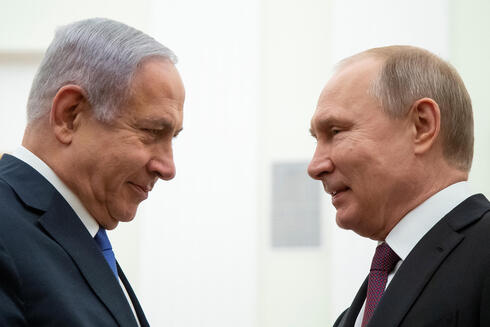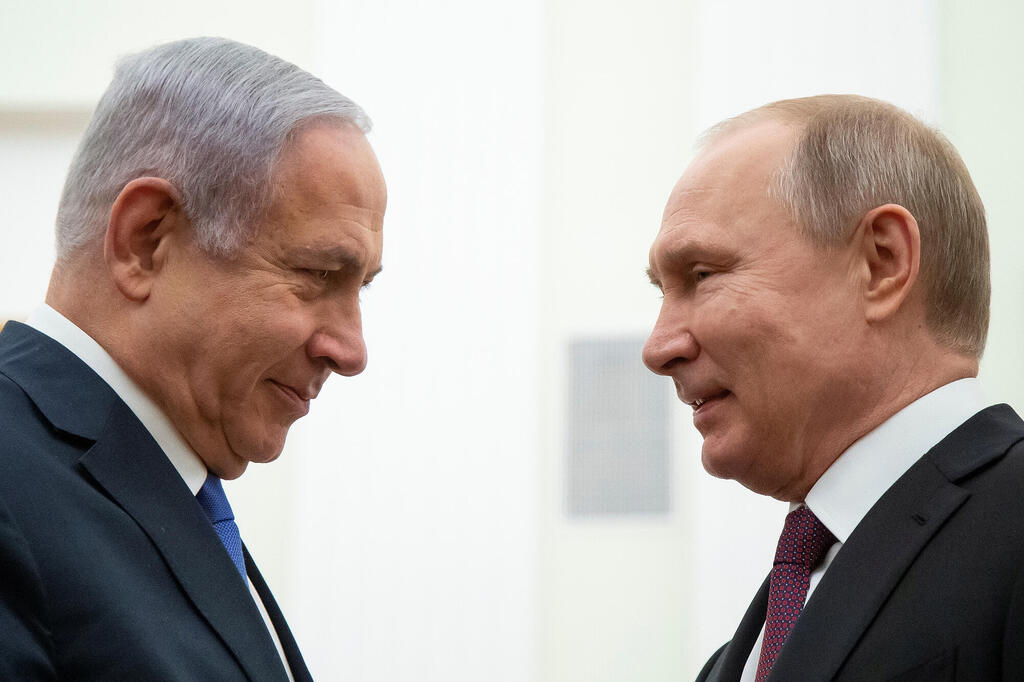
ISRAEL AT WAR
Putin’s pathetic response to Hamas massacre a harsh geopolitical reminder for Netanyahu
For the Russian president, a war in the Middle East is welcome news because it diverts international attention from the atrocities that Russia is committing in Ukraine
"Netanyahu, in a Different League," was the slogan on huge billboards that were deployed across Iדרשקך during the 2021 election campaign. These billboards featured a smiling image of Prime Minister Benjamin Netanyahu shaking hands with Russian President Vladimir Putin. This seemingly warm friendship, which started with the return of Naama Issachar in exchange for undisclosed concessions in favor of Russia, persisted with muted condemnation of the invasion of Ukraine, all in the name of "security coordinations."
Loyalty to Putin, who had been committing war crimes in Ukraine for more than a year and a half, was upheld even as Netanyahu's social media machine intensified its attacks on American President Joe Biden. However, Netanyahu is now facing a backlash from a different league as Putin has revealed his true intentions, which were never in Israel's best interest.
While countries that have historically not been friends of Israel expressed their condemnation and shock at the Hamas attack on October 7, Putin remained silent since Saturday. When he did choose to address the Hamas attack, he expressed support for the terrorists. In doing so, Putin joined a unique and limited club, which includes Iran, Qatar, Lebanon, Syria, Turkey, and Saudi Arabia, all of which claim that Israel is responsible for the violence it faces.
Putin, who only addressed the Hamas attack on Israel during his meeting with Iraqi Prime Minister Muhammad al-Sudani on Tuesday, pointed out that the escalation, as he defined it, was a consequence of the failure of American policies that neglected the interests of the Palestinian people when trying to solve the Middle East conflict. Putin even called for restraint on both sides to minimize harm to civilians.
Putin's spokesperson, Dmitry Peskov, whose wife, a former Russian ice skating champion, is known to holiday in Israel, stated on Tuesday that Putin does not currently plan to intervene in the conflict. However, Peskov added that the Kremlin is deeply concerned about the situation, which poses a risk to the entire region, and they are prepared to facilitate contacts between the involved parties if necessary.
Yesterday, Putin once again addressed the war when he was asked about it at a conference on energy in Russia. In his characteristic style, he said, "If men want to fight each other, let them fight, but women and children on both sides should be left alone." Putin also stated that his ally, Iran, which has drawn closer to Russia since both nations have been ostracized in the international arena, had no involvement in the Hamas attack on Israel. "There is no evidence for this," the Russian president claimed.
Russian citizens, who have gradually come to see through Putin's illusions in the past year and a half, understand that even if their leadership was not directly involved in training Hamas commando forces, they drew inspiration from Putin's actions. Sometimes, this influence occurs unintentionally through Putin's propaganda machine.
For instance, a host of a popular interview program in Russia, affiliated with the government, questioned why Russia didn't warn against posting videos of the atrocities committed by Hamas on social media. Some tried to claim that Hamas had grown stronger by acquiring Western weapons seized in Ukraine.
Many Russian network influencers associated with Putin's regime expressed support for Hamas on social media, while others defended Putin's actions and his army, particularly the Wagner force, as serving as a model for Hamas. They pointed out the similarity in rhetoric between Russia and Hamas.
There are clear signs of Russia's involvement in the October 7 attack, especially in the harsh comparisons drawn between settlements in the Gaza Strip and the massacre carried out by the Russian army in the Ukrainian town of Bucha at the beginning of the invasion. This includes the use of drones in the opening of Hamas's operation at the tactical level and the strategic level. It's challenging to ignore that Iran and Hamas were emboldened by Western countries' reluctance to engage directly in the conflict, choosing instead to provide arms to Ukraine. Ukrainians had warned Israel and the world for months that Iran and Russia were testing new systems, particularly their unmanned aerial vehicles, in the war in Ukraine, and that these technologies might eventually be used against Israel.
For Putin, a war in the Middle East is advantageous. It diverts international attention away from Russia's actions in Ukraine, which have resulted in numerous atrocities over the past two years. Additionally, the strong actions taken by the United States in the Middle East, including the deployment of the aircraft carrier Gerald Ford off the shores of Israel, send a clear message that the U.S. is prioritizing Israel's interests over Ukraine. Unfortunately for Ukraine, this signals that the American commitment to their cause is significantly lower than that of Israel. For Putin, this means he can continue his gradual takeover of Ukraine without interference from outside powers.














